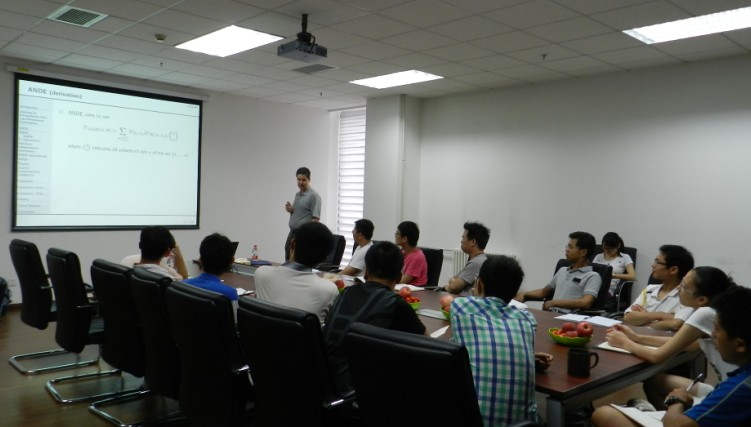Professor Geoff Webb from Monash University visited TIB
Professor Geoff Webb from Monash University visited Tianjin Institute of Industrial Biotechnology, the Chinese Academy of Sciences (TIB) and gave a lecture at the invitation of Prof. Song Jiangning on July 29th, 2013.
Prof. Geoff Webb is the director of Centre for Research in Intelligent Systems (CRIS), Monash University. He is the editor in chief of “Data Mining and Knowledge Discovery” from 2005. He is noted for his extensive study of the Bayes network analysis, conditional probabilities from biological data, statistically sound association discovery and feature based modeling and learning from large datasets.
The title of the report is “ Not so naive Bayesian classification”. Prof. Geoff Webb shared his research with audience. First he introduced Naive Bayes which is an extremely efficient classification learning technique. Despite its simplicity, naive Bayes has been proved remarkably accurate for many tasks. Consequently, it is widely deployed, even though its accuracy is known to be limited by its attribute independence assumption. Among numerous proposals to improve the accuracy of naive Bayes by relaxing its attribute independence assumption, both LBR and SuperParent TAN have demonstrated remarkable accuracy. However, both techniques attain this accuracy at a considerable computational cost. Then he presented a new approach to weakening the attribute independence assumption by averaging all of a constrained class of semi-naive Bayesian classifiers motivated by both theoretical and practical considerations. In extensive experiments this technique delivers comparable prediction accuracy to LBR and SuperParent TAN, with substantially improved computational efficiency. Prof. Geoff Webb also introduced the desirable properties of this approach. Training time that is linear with respect to training set size, supporting parallel and anytime classification, and allowing incremental learning. Despite being generative, it delivers classification accuracy competitive with state-of-the-art discriminative techniques.

